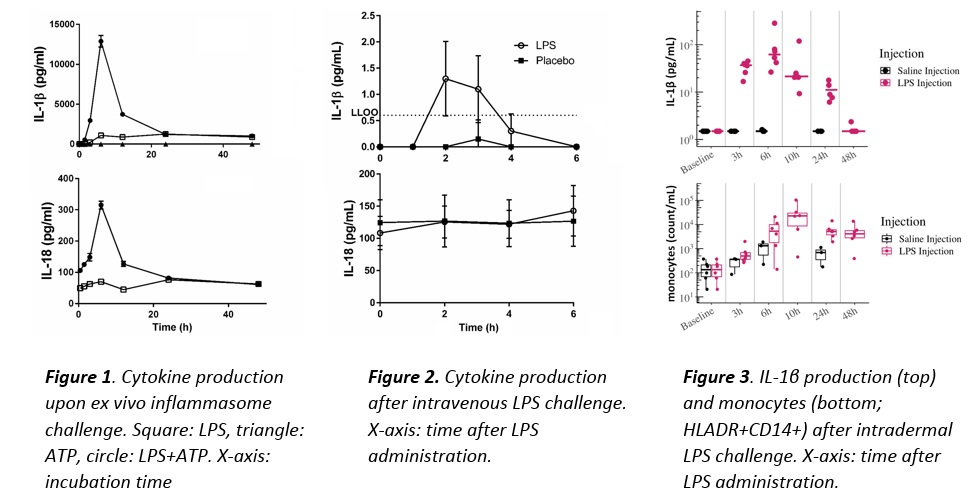Processing of pro-interleukin (IL)-1β and IL-18 is regulated by multiprotein complexes, known as inflammasomes. This process generates bioactive IL-1β and IL-18, two cytokines with potent pro-inflammatory effects. Increased IL-1β and IL-18 production and signaling are implied as key processes in the pathophysiology of various diseases ranging from autoimmune diseases (arthritis, atherosclerosis) to metabolic disorders (diabetes mellitus) and neurodegenerative disease (Alzheimer’s). Pharmacological control of IL-1β and IL-18 production is regarded to be a promising therapeutic approach. Therefore, we aimed to develop and characterize human inflammasome challenges that may support clinical development programs of future investigational compounds suppressing inflammasome activity and/or IL-1β and IL-18 production.
We first initiated ex vivo experiment in which we incubated fresh whole blood of healthy volunteers with LPS and ATP, and subsequently measured the cytokine release in the culture supernatant. We found that this ex vivo inflammasome challenge significantly increased IL-1β and IL-18 (figure 1). Subsequently, we performed an intravenous (IV) LPS challenge in healthy volunteers. However, we found that IV LPS induces a limited systemic IL-1β response, and no IL-18 response (figure 2), limiting the effectiveness of this model. Therefore, we subsequently performed an intradermal LPS challenge and measured cytokines in suction blister exudate. Our data indicates that intradermally administered LPS drives a robust local IL-1β response (figure 3), similar to the response we observed in the ex vivo LPS+ATP challenge, and it enhances cellular influx.

In conclusion, the ex vivo LPS+ATP challenge and the in vivo intradermal LPS challenge may be valuable models for future clinical trials investigating the effects of inflammasome/caspase inhibitors. We will continue to further validate these models, starting with inhibiting systemic and local inflammation, but the results are already very promising.
Contact Research Director Translational Biomarkers Matthijs Moerland for more information: MMoerland@chdr.nl

